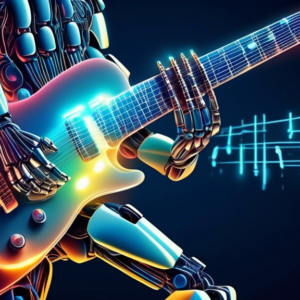My Foray into AI-Generated Guitar Riffs
As a lifelong guitarist with a penchant for sonic exploration, the burgeoning world of artificial intelligence has always piqued my curiosity. The promise of machines capable of generating creative musical ideas seemed both exhilarating and, if I’m honest, a tad intimidating. Would this technology render human creativity obsolete? Or could it be a powerful tool for musicians to break free from creative ruts and discover uncharted sonic territories?
Embracing the AI Revolution: My First Steps
Determined to unravel this enigma, I embarked on a journey to explore the realm of AI-generated guitar riffs. A quick Google search unveiled a plethora of online platforms and software promising to unlock this futuristic musical frontier. Some of these tools were cloud-based, readily accessible through my browser, while others required downloading and installing dedicated software.
For my initial foray, I opted for a user-friendly, web-based AI music generator. The interface was refreshingly intuitive, presenting me with a range of musical styles, from bluesy shuffles to thrash metal riffs, and everything in between. With a mixture of excitement and trepidation, I selected Progressive Metal as my genre of choice and eagerly awaited the AI’s musical offering.
The Moment of Truth: Listening to the AI’s Creation
Within seconds, the platform presented me with a guitar riff. It was a sequence of notes that seemed to cascade through my speakers, a blend of intricate fretwork and soaring melodies. My initial reaction was a mixture of astonishment and cautious optimism. The riff, while undeniably impressive in its technicality, lacked a certain organic feel. It felt almost too perfect, too calculated.
Undeterred, I delved deeper into the platform’s customization options. I experimented with different tempos, time signatures, and key signatures, eager to find the sweet spot where artificial intelligence and my own artistic sensibilities could converge. As I tweaked the parameters, the AI responded in kind, generating variations of the original riff, each with its own unique flavor.
The Human Touch: Refining and Reimagining AI-Generated Riffs
It was during this process of experimentation that I had an epiphany. The true power of AI music generation, at least in its current state, lies not in its ability to replace human creativity, but rather in its potential to augment and inspire it. These AI-generated riffs were not meant to be finished products, but rather raw materials, springboards for my own musical imagination.
Armed with this newfound understanding, I began to view the AI-generated riffs as a starting point. I would take a riff that resonated with me and dissect its underlying structure, analyzing its harmonic progressions, rhythmic motifs, and melodic contours. From there, I would add my own personal touches, embellishing the riff with my own unique phrasing, vibrato, and dynamics.
Unexpected Inspirations: Breaking Creative Barriers
To my surprise, I found myself venturing into musical territories I had never explored before. The AI, unconstrained by the limitations of my own musical biases, presented me with chord progressions and rhythmic patterns that were both familiar and refreshingly alien. This, I realized, was the true magic of AI music generation – its ability to push the boundaries of our creative comfort zones.
One particular riff, initially generated in the style of djent, a subgenre of progressive metal, caught my attention. It was a monstrously heavy riff, characterized by its use of heavily distorted guitars, complex polyrhythms, and dissonant harmonies. As I deconstructed the riff, I found myself drawn to its use of diminished chords, a harmonic device I had rarely incorporated into my own playing.
Inspired, I took this dissonant kernel and transplanted it into a more melodic context. The resulting riff was a unique hybrid of styles, blending the aggression of djent with the soaring melodies of power metal. It was a riff that I could never have conceived of on my own, a testament to the power of AI to spark unexpected creative breakthroughs.
The Future of Music Creation: A Collaborative Symphony
My experience with AI-generated guitar riffs has been nothing short of transformative. It has not replaced my own creativity, but rather amplified it, providing me with a seemingly endless well of musical ideas to draw from. As AI technology continues to evolve at a breakneck pace, I am excited to see what the future holds for musicians.
I envision a future where AI becomes an indispensable tool for musicians of all levels, from hobbyists to seasoned professionals. Imagine a world where you can collaborate with AI to compose entire songs, generate personalized backing tracks tailored to your specific playing style, or even create virtual bandmates that can jam along with you in real time.
The possibilities are as vast as our imaginations. And as we continue to explore the uncharted territories of AI music generation, one thing is certain: the future of music is destined to be a harmonious symphony of human and artificial creativity.
